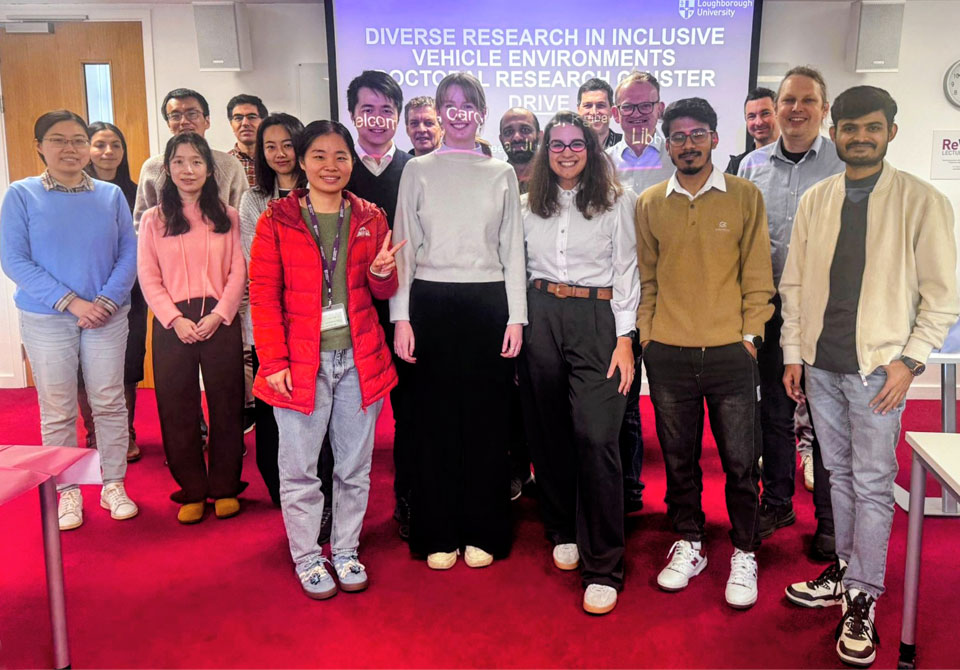Our studentships
Our transdisciplinary PhD projects explore a variety of exciting, cutting-edge topics.
All five of our doctoral researchers are supported by a team of three supervisors and one advisor from at least two Schools.

This ensures that the research has a multidisciplinary approach, maximising learning opportunities and potential employability. Excitingly, this cluster of five studentships offers networking opportunities and a chance to collaborate.
The supervisory team consists of 20 academics from seven Schools, spanning a diverse range of backgrounds and technical research areas. We organise regular seminar and social events for the students.
Our studentship topics
We are delighted to have successfully recruited to the opportunities described below. Please review the projects in which our students are engaged.
From collisions to solutions: RADAR-driven approach for smarter vehicles
Student: Karthik Gugulothu
Supervisors: Dr Aakash Bansal, Dr Yasir Ali, Dr Claire Guo and Professor Will Whittow
Schools: Civil Engineering (ABCE) and Mechanical, Electrical and Manufacturing Engineering (MEME)
Drivers, including autonomous vehicles, often fail to make the right decisions due to mis-judgement, other road users' faults or information not perceivable by sensors.
One of the biggest reasons for failure is perception-based sensors that cannot see beyond obstacles and can miss the right information because of exclusivity.
Karthik will develop new RF-based sensors that can see and collect information beyond obstacles - helping drivers and autonomous vehicles make the right decisions in advance, enabling a more active inclusive mobility.
Inclusive mobility for impaired transport users
Student: Libby Rushton
Supervisors: Professor Andrew Morris, Dr Jingjing Jiang, Dr Jo Barnes and Dr Cecilia Landa-Avila
Schools: Design and Aeronautical and Automotive Engineering
Libby's main question is how equitable might a connected transport system be?
Addressing this challenge involves considering transport users who are either physically or cognitively disabled or impaired to explore how they may be disadvantaged by a futuristic transport system where information about transport and travel may only be digitally available.
There are several user-groups who may not cope well with this eventuality, including autistic travellers, individuals with dyslexia, partially sighted travellers, and individuals with ADHD. Older people may also be disadvantaged by digital systems perhaps because of dementia or other impacts of ageing on cognitive processes.
Libby is examining different transport scenarios, engaging with potentially disadvantaged users and using a Design Thinking approach to understand their needs through empathy and focus groups. Drawing on these findings, she will develop unique co-designed solutions for those who may be most disadvantaged.
Simulation-based optimisation for inclusive transport systems
Student: Masud Ahmad
Supervisors: Dr Haitao He, Dr Marco Discacciati, Dr Miguel Martinez and Dr Eve Zhang
Schools: Civil Engineering (ABCE), Mathematical Sciences, and Aeronautical and Automotive Engineering
As cities grow, ensuring transport systems are equitable, accessible and affordable for all becomes increasingly critical and complex. Masud is advancing simulation-based optimisation methods to address these challenges.
Leveraging large-scale data sets, cutting-edge simulation tools and advanced optimisation techniques, he is modelling and evaluating the effectiveness of various mobility scenarios. His findings will provide actionable insights to shape policies and technological interventions that promote inclusive transport systems.
His research includes collaborations with leading researchers, policymakers and industry partners to make a tangible impact on the future of urban mobility.
Creating the inclusive Strava cyclist
Student: Ana Carolina Gir-O-De-Castro
Supervisors: Dr Brendan Lawson, Dr Asya Natapov and Professor Diwei Zhou
Advisor: Professor Richard Ferguson
Schools: Social Sciences and Humanities, Civil Engineering (ABCE), Mathematical Sciences, and Sport, Exercise and Health Sciences
Ana is investigating the impact of different intervention types - including structural measures, modified materials, vegetation, drainage and covers or barriers - on the hydromechanical behaviour and properties of earthworks, focusing on their vulnerability to climate and weather extremes such as floods, droughts and cyclical wet-dry conditions.
She is exploring whether novel interventions can be developed to reduce vulnerability and enhance recovery from these extremes, evaluating which interventions provide the most significant improvements to resilience.
Her research will also assess intervention carbon- and cost-effectiveness and develop strategies to optimise the type and timing of their deployment.
Intelligent and inclusive public transport
Student: Junru Han
Supervisors: Dr Thomas Steffen, Professor Mahroo Eftekhari, Dr Zhengyu Lin and Dr Lu Tian
Schools: Aeronautical and Automotive Engineering, Civil Engineering (ABCE) and Wolfson
Public transport in England has a notoriously poor use rate outside of big cities which means it is neither effective nor sustainable.
Junru is exploring ways to reinvent public transport by using AI to predict demand and to adapt to individual requests. The idea is to understand the demand on a granular level, to schedule appropriate vehicles and create virtual bus stops that are more convenient and accessible for passengers.
She is also considering inclusivity questions such as rural settings, gender, age and demographics categories - simulating the effect of intelligent dynamic scheduling on individual passengers, looking especially for ways to mitigate any existing discrimination.